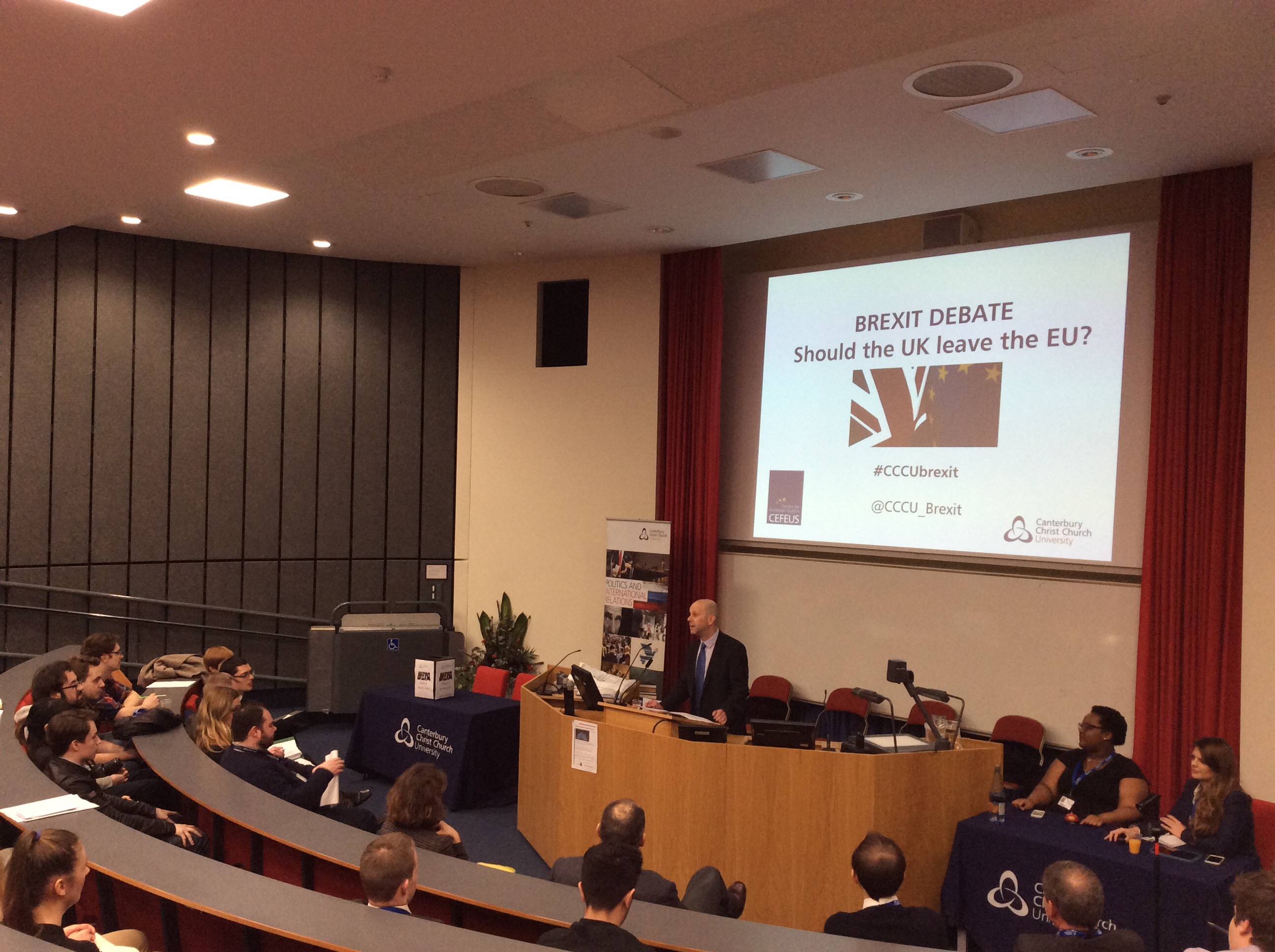Last Friday (26th February) the Politics and International Relations Programme and the Centre for European Studies (CEFEUS) hosted a student-organised debate on Britain’s relationship with Europe, an issue made all the more timely by the recent announcement by the prime minister of an in/out referendum this June. The event was part of a week of debates organised to mark the ten-year anniversary of the Department, which was established by Dr David Bates in 2006. The debate was organised by second-year undergraduate students as part of their Political Research module and saw key roles – introductory remarks, filming, research, chairing and timekeeping – performed by the students themselves. Dr Mark Bennister introduced the speakers and moderated the event.

The talks were kicked off by Jack Barton and Gary Pruce, both second-year students, who summarised the findings of their extensive survey research into local positions on Europe; the results were broken down by age and gender, and seemed to confirm a majority in favour of remaining in Europe, although Jack hinted the scale of support might have had something to do with the large number of students in their sample. Members of the Department’s research community then gave a series of brief ‘mini-lectures’ on Britain and Europe. Dr Sarah Lieberman spoke on the benefits of free movement and the EU’s role in tackling climate change whilst, followed by Dr Benjamin Martill who talked about the relationship between ideologies, party politics and the EU. Next, Dr Amelia Hadfield, CEFEUS Director, explained the external dimension of European Union and the risks of Brexit on British foreign relations, whilst PhD Candidate Paul Anderson discussed the implications of a Brexit for the ‘other’ nations in the United Kingdom; Scotland, Wales and Northern Ireland.
 The centrepiece of the evening was a ‘head-to-head’ debate between Europhile James Flanagan, representing the ‘Britain Stronger in Europe’ campaign, and Eurosceptic Marc Glendening, representing the Democracy Movement, an organisation active in the leave campaign. James made the case for Britain’s economic and security interests being supported by its membership of the EU, whilst Marc argued that the EU was undemocratic and undermined Britain’s sovereignty. Despite their political differences the debate was cordial throughout as the speakers responded to one another’s claims and noted key areas of agreement or disagreement (James conceded that there did exist fundamental problems within the EU, while Marc noted he had always considered himself ‘pro-Europe). At the end of the event Julian Brazier, MP for Canterbury and Whitstable, greeted the audience and took part into the debate – supporting the ‘leave’ campaign – before all three speakers responded to questions from the audience.
The centrepiece of the evening was a ‘head-to-head’ debate between Europhile James Flanagan, representing the ‘Britain Stronger in Europe’ campaign, and Eurosceptic Marc Glendening, representing the Democracy Movement, an organisation active in the leave campaign. James made the case for Britain’s economic and security interests being supported by its membership of the EU, whilst Marc argued that the EU was undemocratic and undermined Britain’s sovereignty. Despite their political differences the debate was cordial throughout as the speakers responded to one another’s claims and noted key areas of agreement or disagreement (James conceded that there did exist fundamental problems within the EU, while Marc noted he had always considered himself ‘pro-Europe). At the end of the event Julian Brazier, MP for Canterbury and Whitstable, greeted the audience and took part into the debate – supporting the ‘leave’ campaign – before all three speakers responded to questions from the audience.
Overall the debate was a great success and very well attended. The Programme would like to extend a big thank you to the speakers for giving our students their time (and wisdom) and especially to those second-year students who made the event possible through their hard work and organisational skills.
 Politics
Politics Anna Vanaga
Anna Vanaga 392
392


